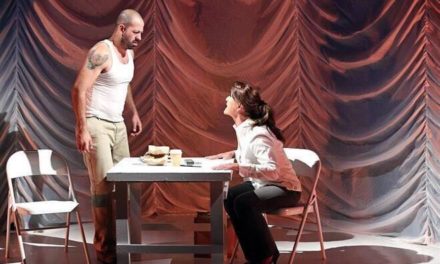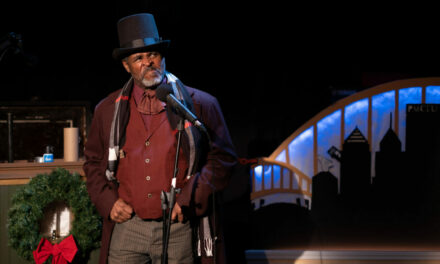A Special Day is based on the 1977 film Una Giornata Particolare by Ettore Scola, starring Sophia Loren and Marcelo Mastroianni. It was adapted to the theater in 1983 by Scola himself and since then it has performed in different stages around the world. It is currently showing in Mexico City and touring around the country with great success, performed by Edith González and Luis Felipe Tovar.
The action takes place on May 6, 1938, a celebration day for fascist Italy, which turns to the reception of Adolf Hitler on his first visit to Rome to meet Benito Mussolini. Almost the entire population attends the parade except for a few people in a building where the plot takes place, the porter, Antonietta (a housewife), and her neighbor Gabriele, who fears the police for some unknown reason. Apart from the political celebration, Antonietta and Gabriele establish a very special emotional relationship that allows them to escape for a few hours from the sadness and monotony of everyday life.
A Special Day manages to reflect in an accurate and simple way the spirit of that time, those difficult times in which fascism controlled society with a firm hand and persecuted those who did not agree with Mussolini and his family, relegating women to be only an object at the service of the husband and children. In that context, there was no place for Gabriele.
Antonietta is a mother of six children and a self-sacrificing wife of a fascist convinced that a woman only takes care of housework and is forced to submit to orders and contempt. This is a reflection of the fascism assumed by the Italians in their everyday life, as well as their interiorization of their values, where the marital life is no more than a routine to follow.

Photo: staff production of the play A Special Day.
At the beginning of the play, the protagonist is dressed up in a robe and slippers. She starts her routine cleaning up the kitchen, making the beds, and preparing the meals for the family. When she feeds her parrot, it escapes and by this chance event, she meets her neighbor Gabriele who is about to commit suicide. Without anyone foreseeing it, two ways of understanding the world will be found: he is a radio announcer who has been fired from his job because of his homosexuality and for his ideas contrary to the regime, while she feels a total fascination with the figure of Il Duce. This encounter will make him recover the joy of being alive and she will feel like a woman again and not as an invisible housewife.
Both characters express antagonistic conceptions of the world: the woman with a supposed irreproachable moral that burns in passion for a man who treats her with affection and not as an object, and a man oppressed and repressed by a society immersed in a hell. And so the play shows several visits from both to their respective departments and throughout the plot, both characters are sharing their problems, feelings, frustrations, and the feeling of living in an environment that oppresses and humiliates them. Gabriele is forced to hide his sexual preferences, denies part of his identity, and feels despair as an individual to satisfy the expectations of others, pretending to live what he is not. Antonietta feels that she is not taken into account as a person, and she lives in a world where her husband is faithful to his ideal. He resorts to prostitutes and even has a loving relationship with another woman, a situation that destroys and humiliates her because she is a woman with a formal education. She is dissatisfied with the role that circumstances have imposed on her: the tasks and fixed attitudes that correspond her as a fascist woman–wife and mother–that nullify her as an individual.
There are no beautiful melodies of love, the soundtrack that accompanies the characters is the omnipresent radio of the porter talking about the pompous parade as if that event and everything that it represents was above them constantly. Everything takes place in the midst of a subtle climate charged with emotion between two wounded and helpless souls who find mutual consolation during that special day that allows them to escape for a few hours from the sadness and monotony of everyday life. But nothing can stifle the silence from the inside of their souls.
Everybody is outside observing the fascist party except the two of them. Lost in a world that is about to explode.
The play reflects the buried bitterness of a country that goes out into the street, but hides at home its miseries and focuses on the evolution of the relationship between the two characters throughout the day in which the famous parade takes place. Later, a third character appears: the porter, who warns Antonietta that this Gabriele is a bad influence and that it is not appropriate for her to talk with him.
The stage is divided into two areas, the departments of both protagonists, and there is a scene that shows one of the most emotional moments of the play: when Antonietta tries to seduce Gabriele, she kisses him and he confesses his homosexuality and rejects her. After a fight, they kiss and finally, they end up making love. She thinks she can change him, but he resists and they finally say goodbye.
The play does not have a happy ending. Gabriele commits suicide, shooting himself before leaving the building because he was going to be confined to an island. Antonietta returns to the routine of a family and a husband that does not see her with the same eyes as before. She has only the book of the Three Musketeers of Alexandre Dumas that Gabriele gave her.
The design of the sound space, as well as that the stage lighting is essential to create that oppressive atmosphere that fuels every minute of the play.
Under the direction of Claudia Ríos, Edith González plays Antonietta and combines the expressiveness of her look with the sadness that her smile gives off during the whole show, getting her character to lose the distrust of the principle and get carried away, confused by wrong conclusions. For his part, Luis Felipe Tovar expresses Gabriele’s ability to play with ambiguity and go through several moods that he acts giving an excellent performance.
This post was written by the author in their personal capacity.The opinions expressed in this article are the author’s own and do not reflect the view of The Theatre Times, their staff or collaborators.
This post was written by Lorena Meeser.
The views expressed here belong to the author and do not necessarily reflect our views and opinions.


















